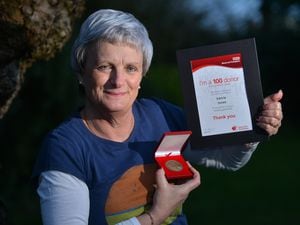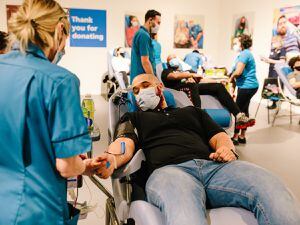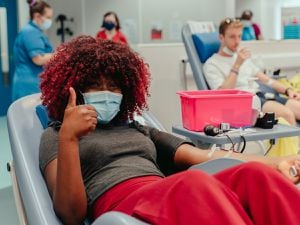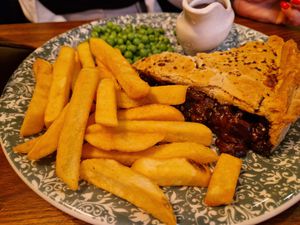Saving lives in 10 minutes: What it's like to be a blood donor
It's something we all tend to take for granted, until we need it. Every day donations of blood save lives.

They provide a lifeline in an emergency and help patients who need long-term treatments for illnesses such as leukaemia or sickle cell disease.
The demand for blood never ceases which is why NHS Blood and Transport continues to appeal for new donors to come forward.
Many people would not be alive today if it wasn't for the generosity of donors.
Around 135,000 new donors are needed every year in England to ensure demand can be met and every day around 5,000 donations are needed to meet the needs of patients.
Each unit of donated blood is separated into different parts, including red blood cells, platelets and plasma, which means that every donation of blood can potentially save up to three lives.

Around two thirds of the blood donated in England is used to treat medical conditions including anaemia, cancer and blood disorders and nearly a third is used in surgery and emergencies including childbirth.
Blood transfusions can also improve the quality of life for people whose illness has no cure.
Kerrie Jones, who lives in Codsall, began giving blood when she was just 18 after attending a session with a work colleague.
Now aged 60, the apprenticeship operations manager has made more than 100 more donations since then and plans to continue for as long as she can.
"I've donated 104 times. I give blood every 16 weeks.Women can give blood every 16 weeks and men can give every 12 weeks. I really make an effort to keep my appointments because I know how much the blood is needed. Whenever I donate, I always make the appointment for my next donation straight away," says Kerrie, who is chairman of Netball West Midlands.
Giving blood takes around an hour in total, including time for snacks and a drink, with the donation itself only taking up to 10 minutes.
"Giving up an hour of your time every three or four months is nothing really, especially when you can save someone's life. I think it's an important thing to do because hospitals always need blood. And you never know when you might need a blood transfusion yourself," says Kerrie, who attends sessions across the Black Country, Staffordshire and Shropshire.
Before giving blood, donors are urged to eat regular meals, drink plenty of fluid and avoid vigorous exercise or exertion.
They will need to complete a Donor Safety Check form,. When you attend a session, you will be given 500ml of fluid usually water or fruit squash, to drink and be called for a private health screening.
This is to conform your identity, check that it's safe for you to donate and that your donation is safe for a patient to receive.
For your wellbeing, staff must ensure you have enough haemoglobin (iron) in your blood before donating. The test involves taking a small blood drop from your finger to firstly test your iron levels by dropping the blood into a vial of copper sulphate solution. If the blood sinks to the bottom in a set time, you can give blood.

When you are called to start your donation, after getting comfortable on the chair, a blood pressure cuff will be placed on your arm to maintain a small amount of pressure during the process.
Your arm will be thoroughly examined to find a suitable vein before being cleaned with an antiseptic sponge. This kills normal bacteria on the skin.
Following needle insertion you should be comfortable during your donation. An agitator scale constantly weighs and measures your donation and it will stop automatically when your donation is complete.
A full donation is 470ml and will usually take between five and 10 minutes.
When it's finished, the needle will be removed and a sterile dressing applied to your arm. You will then be directed to the refreshment table where a selection of drinks and snacks are available.
All donors are encouraged to relax for at least 15 minutes and to have at least two drinks following donation.
Kerrie's advice for anyone who is wanting to donate but is feeling a bit daunted by the process is to ask someone to accompany them.
"If you can find someone to go with you, ideally someone who already gives blood but normally the staff allow someone to sit with you if you're feeling nervous.
"But if you can't find anyone, the staff are wonderful and will look after you if you're feeling nervous and will explain what's going to happen.
"I can understand people being worried about needles or that it will hurt but it's doesn't hurt and it's nothing to worry about," she tells Weekend.
"I think it's really important that I carry on giving as long as I can because it's needed. I volunteer for Netball West Midlands and I just see giving blood as being a volunteer that can save people's lives and make a difference," adds Kerrie.
NHS Blood and Transplant launched its biggest ever blood donor recruitment drive ‘This is Amazing’ in October last year. To make up for the fall in new donors during the pandemic, 100,000 new blood donors need to register to donate by this spring.
In recent years there’s been a particular need for more black donors, who are more likely to have the RO sub-type blood needed to help treat people with sickle cell.
To make an appointment or find out more see www.blood.co.uk or call 0300 123 23 23.





